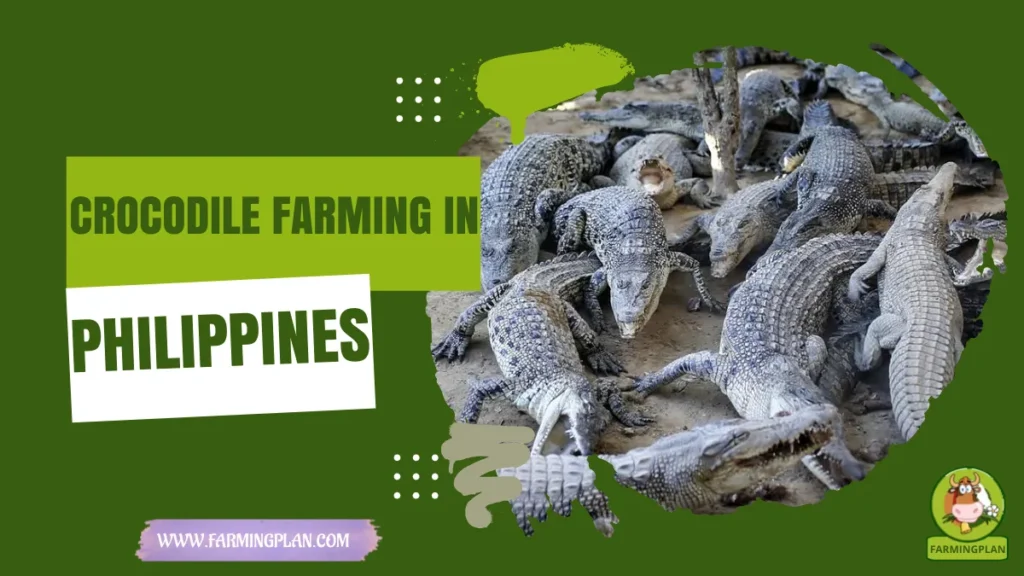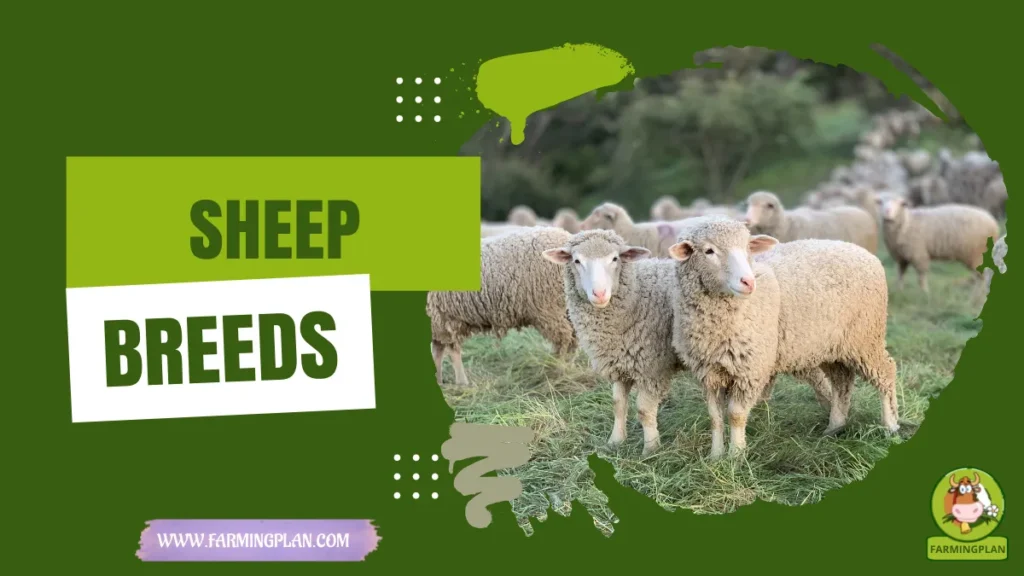Have you ever seen a horse so miniature it could fit in your backyard and still have room to trot? That’s exactly what a Miniature Horse is—tiny, friendly, and full of life. I’ve spent years raising and working with these small wonders, and I can honestly say they’re not just adorable—they’re brilliant, gentle, and helpful. From mini horses to micro ponies, these little equines have significantly impacted people’s lives. Whether you’re a beginner looking for a low-maintenance companion or someone exploring miniature horsemanship, these horses are ideal for all kinds of owners. They’re also being used more and more as service animals, proving that size has nothing to do with strength or heart.
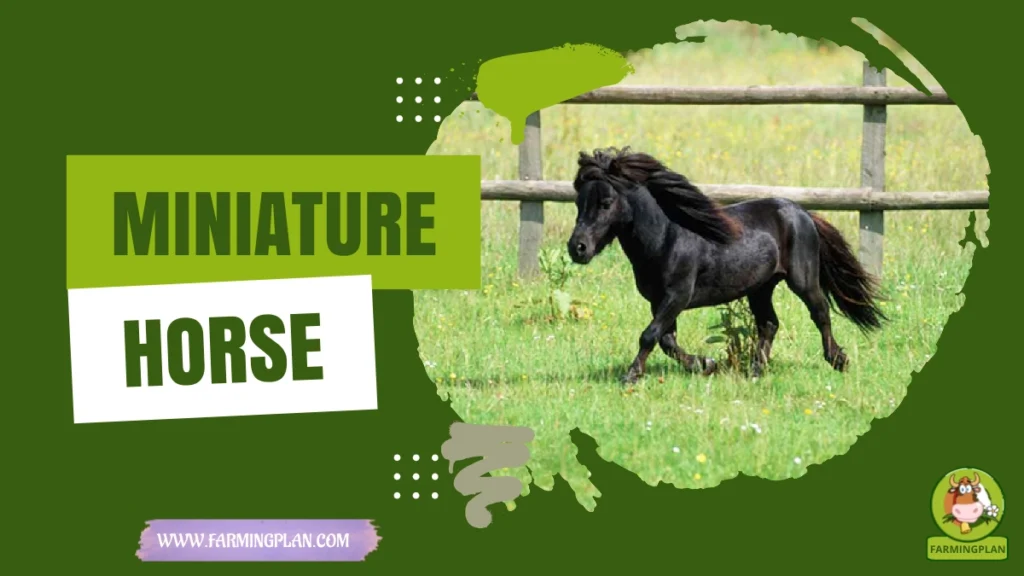
History & Origin of Miniature Horse
When I first got into Miniature Horses, I was amazed to learn how rich their history is. These small horses aren’t just a modern trend—they’ve been around for centuries. Their story begins in Europe, where selective breeding was used to develop compact horses for specific jobs. Some were used as Dutch mine horses, small enough to work in tight underground tunnels but strong like their larger counterparts.
Over time, these tiny equines caught the attention of the wealthy. Nobles loved showing them off as symbols of status and refinement. But the real turning point came in America. Breeders focused on improving conformation and size, and that’s how we got the American Miniature Horse. Unlike ponies, these horses were carefully bred to keep the proportions and personality of full-sized horses, just in a smaller package.
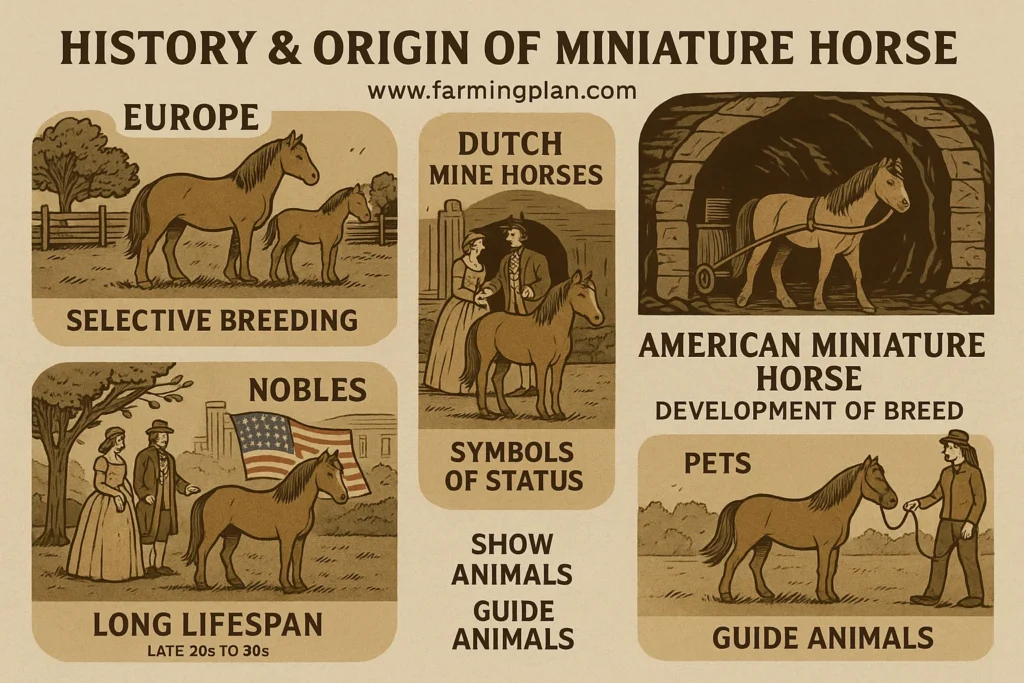
Miniature Horses, like their larger counterparts, can live for many years, often reaching their late 20s or even 30s. This is something to consider when deciding to bring one into your life. Their popularity grew as people realized their potential—not just for work, but as pets, show animals, and even guide animals. With the right breeding methods, Miniature Horses became well-balanced, beautiful, and full of personality. That’s when I knew I had to be part of the Miniature Horse community.
Reads More: Jersey Cattle: Incredible Milk Producers You’ll Love
Characteristics
When people first encounter my Miniature Horses, they often ask, “Are they ponies?” It’s a valid question, but the truth is that miniature Horses are not just diminutive horses or mini ponies. They are a distinct horse breed that embodies the same body shape and personality as full-size horses, just in a more compact form, which is genuinely fascinating.
Most mini horses stand under 34 inches tall at the withers. Their build is elegant, with straight backs, long necks, and strong legs. You’ll find them in every coat colour and pattern, just like larger horses. I’ve raised Falabella ponies, mini Shetlands, and miniature stallions, each with their own charm. Some even have the build of a tiny draft horse, which is just stunning.
People often confuse micro mini horses and miniature ponies, but there’s a difference in structure. Minis have more refined features, while ponies tend to be stockier. The beauty of these animals is in their well-balanced conformation. Whether you want a mini saddle horse for light riding or a show-quality miniature stallion, you’ll find amazing variety.
Nature & Temperament
One thing I love most about Miniature Horses is their sweet and calm nature. These little horses are full of personality. They’re smart, playful, and love being around people. Whether I’m grooming one of my mini stallions or just sitting with a micro pony, they always respond with curiosity and affection. Miniature Horses are incredibly gentle, which makes them ideal for families, seniors, or anyone with limited horse experience.
They get along great with children and even other animals. I’ve seen mini horses and ponies form strong bonds with dogs, goats, and even full-sized horses. Because of their friendly nature, many miniature horses are used as therapy or service animals. They bring comfort to people in hospitals, homes, and schools. It’s amazing how such a tiny horse can make such a big emotional impact.
Like their larger counterparts, Miniature Horses require attention and training. By investing time, building trust, and treating them with respect, you can cultivate a lifelong friendship. They thrive when they are part of a loving routine and feel like a valued member of the family. This responsibility and commitment to their well-being are key to their happiness.
“Tiny Horses With Big Hearts Make The Best Companions—Discover How To Care For Your Miniature Horse Like A Pro!”
Food & Diet of Miniature Horse
Feeding a Miniature Horse isn’t just about tossing hay in a bucket. These little horses have unique needs, and I’ve learned over the years that their health depends on a well-balanced diet. Unlike full-sized horses, minis don’t need large portions—but they do need the right nutrition. I feed my mini horses mostly high-quality grass hay.
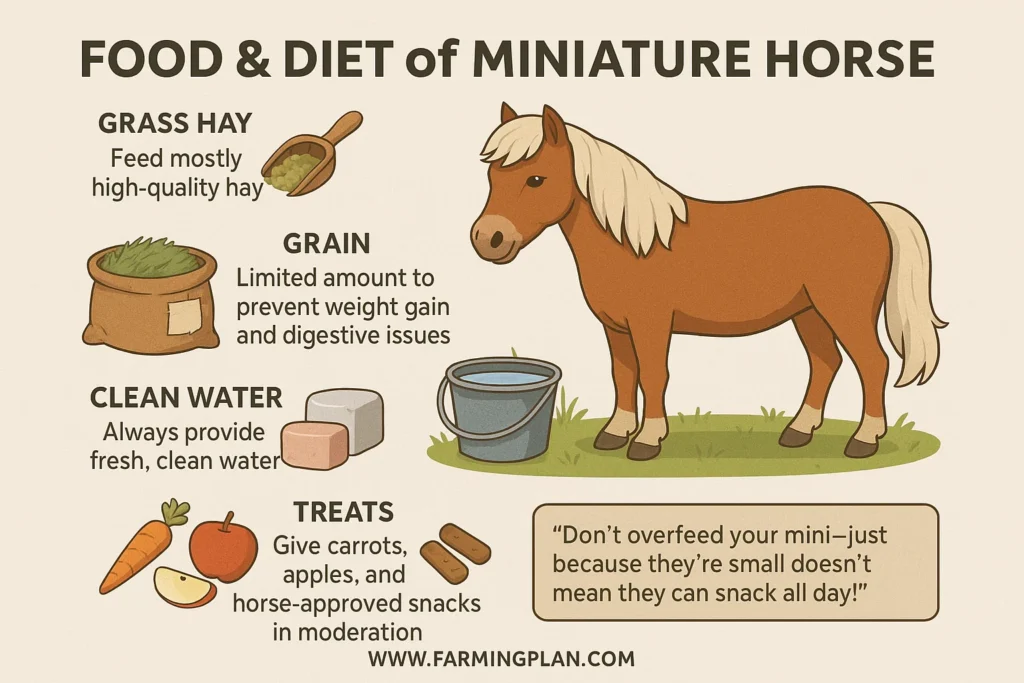
They also enjoy a little grain, but I keep it limited to avoid weight gain and digestive issues. Since they’re small, even a little too much food can lead to serious health problems like laminitis or obesity. Clean water is a must. I always make sure their water buckets are fresh and full. I also like to add salt licks and mineral blocks in their stalls or pastures to give them extra nutrients.
Treats are fun, too—my minis love carrots, apples, and a few horse-approved snacks, but I use them sparingly. And if you ever wonder what’s safe or not, talk to a vet who understands Miniature Horse care.”Don’t overfeed your mini—just because they’re small doesn’t mean they can snack all day!”
Usage & Purpose
When people think of Miniature Horses, they often picture them as cuddly pets—and they’re right! But these little horses do so much more. I’ve worked with mini horses and ponies in many settings, and their talents always surprise me.
Miniature Horses are not just cuddly pets-they are versatile animals with a wide range of uses. Their calm nature and trainability make them excellent service animals. I’ve witnessed minis serving as guide animals, emotional support companions, and even therapy horses in hospitals and care homes. Their potential uses are truly inspiring.
They’re also perfect for families who want a horse without the large space requirements of full-sized horses. You can keep them in a backyard with proper fencing and care. Some of my neighbours even have a mini saddle horse for their kids to lead around safely. In the show world, miniature horsemanship is growing fast.
These little horses shine in driving, halter, and obstacle events. They also participate in fairs, parades, and community outreach programs. Breeders often raise them for their looks, conformation, or rare traits like the Falabella horse bloodline. Whether you’re looking for a miniature pony for sale to show, help, or simply love, there’s a perfect purpose for every mini horse.
Special Features
Over the years, I’ve raised many horse breeds, but Miniature Horses always impress me with their unique qualities. They may be small, but they have features that truly set them apart from any other equine. One of the first things you’ll notice is their refined build. Even though they’re tiny, their body proportions match those of full-size horses.
They have straight legs, broad chests, and elegant heads. Some even resemble tiny conformation draft horses, especially the ones bred with strong bloodlines. What’s really fascinating is their intelligence. These horses are smart and eager to learn. I’ve trained several mini stallions to respond to voice commands, pull carts, and complete obstacle courses with ease. Their sharp minds make them a joy to work with.
Another special trait is their long lifespan. A healthy Miniature Horse can live up to 30 years or more. That makes them a long-term companion—perfect for families who want a lifelong friend. And, of course, their versatility is unmatched whether it’s for showing, therapy work, or just being a fun backyard buddy, a Miniature Horse can do it all.
Reads More: Giant Runt Pigeon: Amazing Breed With Giant Size and Charm
Health Issues & Prevention of Miniature Horses
Taking care of a Miniature Horse means more than feeding and grooming. Health is a big deal, and from my years of raising mini horses, I’ve learned that prevention is the key to a long, happy life. Because they’re small, Miniature Horses are more likely to suffer from obesity and laminitis if they’re overfed or not exercised properly. I always watch their weight closely and avoid giving them too many treats. A well-managed diet keeps them in great shape.

Dental issues can also pop up. Their tiny jaws can lead to crowded teeth, so I schedule regular dental checkups. If you notice your mini horse dropping food or losing weight, it’s time for a vet visit. Another thing to watch for is dwarfism-related conditions, especially in minis bred without proper genetic care. That’s why I always support selective breeding with a focus on health and conformation.
Parasite control is a must, too. I follow a regular deworming routine and keep their stalls clean. Proper vaccinations, hoof care, and clean water go a long way in avoiding common infections. Healthy Miniature Horses are active, alert, and curious. When you notice changes in their behavior or energy, please don’t ignore it. A quick check can save you a lot of trouble later.
Step-by-Step Pet Owner Care Guide for Miniature Horses
If you’re thinking about bringing a Miniature Horse into your life, here’s a simple guide from my own experience to help you care for these amazing animals:
Step 1: Prepare Their Living Space
Set up a safe, fenced area with plenty of room to move. Mini horses need shelter from harsh weather, so provide a stable or run-in shed with clean bedding.
Step 2: Choose the Right Feed
Feed your mini a diet of good-quality hay and limited grain. Always provide fresh water and salt or mineral blocks. Avoid overfeeding to prevent obesity.
Step 3: Regular Grooming
Brush your miniature horse daily to keep their coat clean and check for skin problems. Clean their hooves every day to prevent infections.
Step 4: Health Checkups
Schedule regular visits with a vet for vaccinations, dental care, and deworming. Watch for signs of illness, such as loss of appetite or unusual behaviour.
Step 5: Exercise and Social Time
Spend time with your mini daily. Gentle exercise, like walking or light play, keeps them fit. They love companionship, so consider having another mini or friendly animal around.
Step 6: Training and Handling
Start training early with simple commands and gentle handling. Be patient and consistent. Miniature horses are smart and respond well to positive reinforcement.
Step 7: Safety First
Always use proper tack designed for miniature horses, such as a miniature horse saddle or halter. Keep their environment free of hazards. Following these steps has helped me raise healthy, happy Miniature Horses that are a joy to own.
Expert Tips & Best Practices for Miniature Horse Care
From my years of working with Miniature Horses, I’ve picked up some tips that really make a difference:
- Always choose your miniature horse from reputable breeders who focus on health and desirable breeding traits. This helps avoid genetic problems.
- Invest in the right tack, like a miniature horse saddle and proper mini horse tack, so your horse stays comfortable and safe during rides or shows.
- Pay close attention to your mini’s diet. Remember, they don’t need as much feed as larger horses, and too many treats can cause weight issues.
- Socialization is key. Mini horses thrive when they have company—either other minis or friendly animals—to keep them happy and reduce stress.
- Keep their living area clean and safe. This prevents infections and keeps your mini feeling its best.
- Regular exercise isn’t just good for their body—it keeps their mind sharp, too. Even light daily activity helps.
- Join the Miniature Horse community online or locally. Connecting with other owners gives you valuable advice and support.
- Lastly, be patient and consistent with training. Mini horses are intelligent and love learning new things when treated kindly.
These practices have helped me raise strong, healthy, and well-behaved minis, and I’m confident they’ll help you, too.
Where to Buy Miniature Horses: Finding Your Perfect Mini
If you’re ready to buy a miniature pony or mini horse, it’s important to find a trusted source. I always recommend doing your research to ensure the health and quality of your new friend. Start by looking for breeders who specialize in American Miniature Horses or other recognized breeds like the Falabella horse.
Good breeders focus on selective breeding for health and good conformation, and they will be transparent about the horse’s history. You can find miniature horses for sale near me by searching local horse farms, rescue organizations, or online listings. Places like mini horse rescues often have wonderful minis that need loving homes.
When buying, ask about the horse’s health, temperament, and any special needs. Visiting the farm to see the living conditions and meet the horse is ideal. Prices for miniature horses vary based on age, training, and bloodline. Be prepared to invest time and money, but know that a healthy mini horse is a joyful companion worth it.
FAQs
How big does a Miniature Horse get?
Miniature Horses usually stand between 34 and 38 inches tall at the withers. They are much smaller than full-sized horses but keep the same proportions.
Are Miniature Horses good pets for families?
Yes! Miniature Horses make excellent pets because of their gentle nature and manageable size. They are especially great for families who want a horse but have limited space.
What do Miniature Horses eat?
Miniature Horses mainly eat good-quality hay and need fresh water daily. Grain should be fed sparingly to avoid health problems like obesity.
Can Miniature Horses be trained for work or shows?
Absolutely. Mini horses can be trained for driving, showing, and even as service animals. Their intelligence and willingness to learn make training rewarding.
Where can I buy a healthy Miniature Horse?
Look for reputable breeders specializing in Miniature Horses or check local rescue organizations. Always visit the horse and ask about health history before buying.
Conclusion
From my experience as a farming specialist, Miniature Horses are wonderful companions that offer much more than their small size suggests. They combine the beauty and spirit of full-sized horses with unique traits like intelligence, versatility, and a long lifespan. Caring for minis requires special attention to their diet, health, and social needs, but the rewards are great. Whether you want a friendly pet, a service animal, or a show star, understanding their history, care, and behaviour is key. With proper guidance and love, a Miniature Horse can bring joy and companionship to your life for many years.

